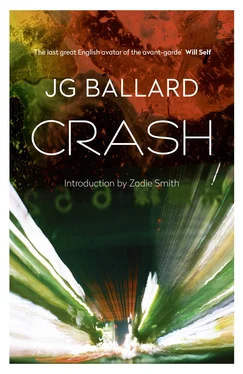Still, it’s easy to be shocked the first time you read Ballard. I was for some reason scandalized by this convergence of sex and wheels, even though it is enshrined in various commonplaces (not to mention the phrase ‘sex on wheels’) What else do we imply when we say that the purchase of a motorbike represents a ‘mid-life crisis’, or that a large car is compensation for a lack of endowment? But, of course, in the fictional version of our sexual relationship with cars, it is we, the humans, who are in control; we determine what we do in cars. In Ballard’s reality it is the other way round:
What I noticed about these affairs, which she described in an unembarrassed voice, was the presence in each one of the automobile. All had taken place within a motor-car, either in the multi-storey car-park at the airport, in the lubrication bay of her local garage at night, or in the laybys near the northern circular motorway, as if the presence of the car mediated an element which alone made sense of the sexual act.
In 1973, horrified readers condemned such passages as fantastical pornography. Thirty years later, in England, a very similar scene burst onto the front pages and even received an official term: dogging. (And at the centre of that scandal was one of the biggest television stars in the country, natch. )
The real shock of Crash is not that people have sex in or near cars, but that technology has entered into even our most intimate human relations. Not man-as- technology-forming but technology-as-man-forming. We had hints of this, too, a long time ago, in Marinetti’s Futurist Manifesto of 1909, which makes explicit the modernist desire to replace our ancient Gods and myths with the sleek lines and violent lessons of the automobile. It also features an orgasmic car crash: ‘When I came up – torn, filthy, and stinking – from under the capsized car, I felt the white-hot iron of joy deliciously pass through my heart!’
But Marinetti’s prose is overwrought, deliberately absurd (‘We went up to the three snorting beasts, to lay amorous hands on their torrid breasts. I stretched out on my car like a corpse on its bier, but revived at once under the steering wheel, a guillotine blade that threatened my stomach’) where Ballard is calm and collected. That medic’s eye, dispassionate, ruthless:
Braced on his left elbow, he continued to work himself against the girl’s hand, as if taking part in a dance of severely stylized postures that celebrated the design and electronics, speed and direction of an advanced kind of automobile.
Marinetti’s hot-headed poets and artists wrestled with the icon of the motorcar. Ballard’s ciphers coolly appraise it. The iciness of Ballard’s style is partly a consequence of inverting the power-balance between people and technology, which in turn deprives his characters of things like interiority and individual agency. They seem mass-produced, just like the things they make and buy. Certainly his narrators and narrators manqués are not concerned with the personalities of human beings:
Vaughan’s interest in myself was clearly minimal; what concerned him was not the behaviour of a 40-year-old producer of television commercials but the interaction between an anonymous individual and his car, the transits of his body across the polished cellulose panels and vinyl seating, his face silhouetted against the instrument dials.
It’s almost as if the stalker-sadist Vaughan looks at humans as walking-talking examples of that Wittgensteinian proposal: ‘Don’t ask for the meaning; ask for the use.’ When Ballard called Crash the first ‘pornographic novel about technology’, he referred not only to a certain kind of content but to pornography as an organizing principle, perhaps the purest example of humans ‘asking for the use’. In Crash , though, the distinction between humans and things has become too small to be meaningful. In effect things are using things. (And a crazed stalker like Vaughan becomes the model for a new kind of narrative perspective.)
Now, I don’t think it can be seriously denied that some of the deadening narrative traits of pornography can be found here: flatness, repetition, circularity. ‘Blood, semen and engine coolant’ converge on several pages, and the sexual episodes repeat like trauma. But surely this flatness is deliberate; it is with the banality of our psychopathology that Ballard is concerned:
The same calm but curious gaze, as if she were still undecided how to make use of me, was fixed on my face shortly afterwards as I stopped the car on a deserted service road among the reservoirs to the west of the airport.
That seems to me a quintessential Ballardian sentence, depicting a denatured landscape in which people don’t so much communicate as exchange mass-produced gestures. (Reservoirs are to Ballard what clouds were to Wordsworth.) Of course, it was not this lack of human interiority that created the furious moral panic around this book (and later David Cronenberg’s film). That was more about the whole idea of penetrating the wound of a disabled lady. I was in college when the Daily Mail went to war with the movie, and found myself unpleasantly aligned with the censors, my own faux-feminism existing in a Venn diagram with their righteous indignation. We were both wrong: Crash is not about humiliating the disabled or debasing women, and in fact the Mail ’s campaign is a chilling lesson in how a superficial manipulation of liberal identity politics can be used to silence a genuinely protesting voice, one that is trying to speak for us all. No one doubts that the abled use the disabled, or that men use women. But Crash is an existential book about how everybody uses everything. How everything uses everybody. And yet it is not a hopeless vision:
The silence continued. Here and there a driver shifted behind his steering wheel, trapped uncomfortably in the hot sunlight, and I had the sudden impression that the world had stopped. The wounds on my knees and chest were beacons tuned to a series of beckoning transmitters, carrying the signals, unknown to myself, which would unlock this immense stasis and free these drivers for the real destinations set for their vehicles, the paradises of the electric highway.
In Ballard’s work there is always this mix of futuristic dread and excitement, a sweet spot where dystopia and utopia converge. For we cannot say we haven’t got precisely what we dreamed of, what we always wanted, so badly. The dreams have arrived, all of them: instantaneous, global communication, virtual immersion, bio-technology. These were the dreams. And calm and curious, pointing out every new convergence, Ballard reminds us that dreams are often perverse.
New York, 2014
Конец ознакомительного фрагмента.
Текст предоставлен ООО «ЛитРес».
Прочитайте эту книгу целиком, купив полную легальную версию на ЛитРес.
Безопасно оплатить книгу можно банковской картой Visa, MasterCard, Maestro, со счета мобильного телефона, с платежного терминала, в салоне МТС или Связной, через PayPal, WebMoney, Яндекс.Деньги, QIWI Кошелек, бонусными картами или другим удобным Вам способом.












